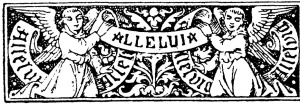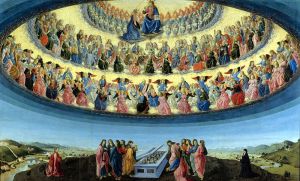Words matter. Especially in the liturgy. Every word can be richly symbolic and expressive of our faith (if we don’t mess with them). We have to remember that the words, even pronouns like “his”, really do matter.
If you feel a rant coming on…you probably know me in real life. But bear with me as I explain… One of the things that really bugs me is not only when people decide on their own to change the words of the Mass (which is one thing) but also to teach other people the incorrect words, going so far as to give reasons why their words are better than those given to us by the Church! There are so many things wrong with this, including poor liturgical theology, that we can’t get into all of them here. Let us examine just one example and see why the change does not make sense.
Here is one part of the Mass I notice quite often people change the word “his” to “God”:
May the Lord accept the sacrifice at your hands, for the praise and glory of his name, for our good, and the good of all his holy Church.
Okay, step back and look at the prayer of the priest right before it:
Pray, brethren, that my sacrifice and yours may be acceptable to God, the almighty Father.
First, notice that this prayer is addressed to God the Father. We are speaking about a specific role for this specific person of the Trinity, whose role is associated with male characteristics. This does not mean God the Father is anatomically male, but that he has characteristics of ontological male-ness, that is, the truth of his being has qualities of male-ness. Both man and woman are created in the image and likeness of God, and I am not suggesting that we ignore that, but I am saying they are different. Despite what secular culture wants you to believe, men and women are not the same at a fundamental level of their being. In this particular instance, we are saying something about God as Father, and that is an important distinction. There are other times when we properly express other qualities of God. The words of the liturgy are completely interconnected, and to arbitrarily change “His” to “God’s” because you want to remove the male pronoun actually means you just didn’t listen to the prayer right before it.
Secondly, it becomes a grammatical error. We don’t want to imply that “Lord” and “God” are two different entities, which is what it often sounds like if you change these words. That would be a serious problem.
Finally, a very important principle to remember, which is reiterated in the Second Vatican Council (SC 22), is that no person, not even a priest, may change the Mass. This would include the words.
Think this week about the specific words you are praying, how they relate to the rest of the liturgy (as each prayer does not exist in a vacuum) and how these words express the different facets of our faith.

